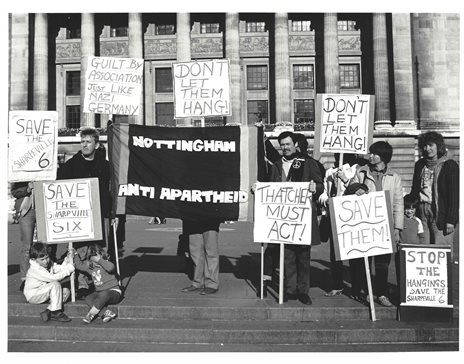What kinds of stories?
Anti-Apartheid activism in the UK involved a wide range of activities. These ranged from demonstrations, pickets, marches and meetings, through to government lobbying and consumer, cultural and sporting boycotts. It encompassed all kinds of events and gatherings in communities, to raise funds or collect material aid, increase awareness and express solidarity.
Who can contribute?
All contributions are welcome, no matter how ‘small’. We would like to hear from anyone who has a story or recollection about any form of anti-Apartheid activity in the Nottingham area.
These might include:
- activities co-ordinated by the AAM branch
- activities linked to other groups (e.g. a local community organisation, church, student group, political group, or union)
- actions and events you yourself participated in
- stories about family members or friends
- memories of seeing or hearing things in the local area or on the news
We are particularly keen to hear from any members of Nottingham’s black, Asian, and other ethnic minority communities who have stories or opinions they want to share. Black British solidarity was a vital dimension of the movement against Apartheid and the links with anti-racism in Britain are an important issue.
How to contribute
You can tell us your story via an online form.
Before you contribute, please read the participation information sheet, consent form and the University’s privacy notice carefully. This explains how we process and protect your data.
By proceeding to complete the form, you are confirming that you have read the participation information sheet, consent form and privacy notice and are satisfied with the contents. As indicated in these documents, you have the option of complete anonymity for your contribution or you may prefer to be identified if we include your story in the dissemination of findings.
If you are happy to proceed, go to the online story form.
Please contact the researchers by email if you have any queries.
Sharing the results of the research
The first publication of research findings is now ready: Mapping the history of anti-apartheid activism in Nottinghamshire, a collection of stories and images linked to geographical locations in Nottingham, Mansfield and Worksop.
In 2022, the materials will be expanded into a hard copy publication featuring more story detail, memorabilia, thematic context and portraits of the activists.
Nottingham AAM members at the vigil and demonstration to support the 'Sharpeville Six' at Nottingham Council House. (C) John Birdsall Social Issues